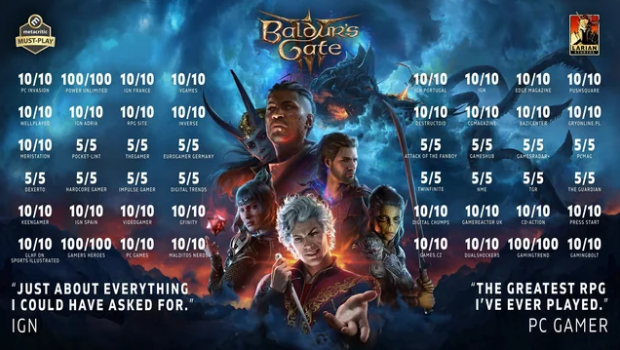The state of the video game industry is abysmal at best. Despite its formidable growth in the past decade (now valued at more than the music and movie industries combined at a massive $214.2 billion), the game industry has become an increasingly hostile environment to game developers– belonging to studios AAA* or otherwise. Nearly every major AAA title that has been released in the past few years has been criticized for being incomplete to the point of being unplayable. Nearly every major studio has had reports of workplace abuse and misconduct. Nearly every major developer has had to face inane time crunches and demands to be paid their subpar salary. What happens when a game is released that doesn’t feature any of that?
One doesn’t have to be intrinsically involved in the game industry to know that modern gamers have faced hulking amounts of dissatisfaction from recent games. The overwhelming majority of games released in the past years are criticized as “incomplete” and/or “buggy”; all complaints of this nature are typically patched** in the game studio’s attempt at remedying the controversy. However, this isn’t enough to satiate the consumer, who now feels deceived by their full-cost purchase (varying from $50 to $80) of an empty promise. If one were to list all of the universally disappointing game releases from the year 2023 alone, it would consume pages and pages of this essay (as a previous draft could confirm). For brevity’s sake, my examples will be limited to the most influentially pathetic releases. Cyberpunk 2077, Gotham Knights, Forspoken, and Redfall all lured in potential fans with fully fleshed-out worlds featuring compelling writing, glorious next-gen graphics, and engaging gameplay in their respective trailers.
However, these worlds remained inside the trailers alone, never being portrayed accurately in the full releases of the games they advertised. What the consumer instead purchases when they obtain this game is a fifteen-hour (maximum) game taking place in a barren world with incredibly janky graphics and none of the engaging gameplay or story assured in the trailer. When asked about his opinion on the subject, Chemistry teacher and sponsor of Santa Rosa Academy’s Video game Club said “I am strongly against the changes that are occurring around video game production and the sales model that most companies seem to be gravitating toward. It is unfortunate that games, especially those from the leading game-holding, production, and publishing companies, are often released with buggy and incomplete code. It feels like these companies are trying to squeeze every cent from the consumer by giving half of the intended storylines at release and following up with pricey DLCs that complete the base game. Previously, the reality around video games was that one could purchase a complete video game upon release and when developers did provide DLCs, it was aimed at expanding a complete game. Now it is almost expected that you buy the game release knowing that you only really get 75% of a game at best….Developers who continue to work on a game deserve to make money from their work and product but the trend I see currently taking place does not benefit the average consumer/gamer. “
Some games, however, still retain the attention of the consumer by promising their game will improve with more financial investment. The live-service game model is exactly this. Some of the most lucrative titles in the world such as Fortnite, Overwatch, Grand Theft Auto Online, Genshin Impact, League of Legends, and many more may be free to download, but beseech the player for their money repetitively after launch. In these games, you can purchase in-game currency to buy cosmetics for your character. Or, alternatively, the game will offer a lootbox-type system. Lootboxes are virtual gambling– accessible by easily manipulated crowds such as children or the mentally disabled– that advertise themselves as an innocent game expansion. They profit on the exploitation of their audience as well as irresponsibly addictive measures. When approached with the subject, gaming hobbyist Autumn Howe said “…the game industry has turned into a constant money-grab with developers locking so much of a game behind a paywall. And this gets supported by players who will openly make fun of people for not paying for these things.” Might I add, the vast majority of live-service games have an ESRB*** rating of E or T.
However, I’d argue that a small amount of this is at fault of the developers. While the average consumer is being cheated out of their money due to misleading advertisements, a significant amount of developers are overworked and underpaid. Not only do statistics show that 98% of game developers aren’t paid enough to support themselves based on video games alone, but they are also intensely overburdened. In the game industry, overtime isn’t present and instead takes the form of “crunch”– defined as unpaid 65-80 hour work weeks. Crunching can sometimes be in addition to a developer’s average work week of 40-50 hours. Furthermore, game developers can rarely feel secure in their own work environment– and rightly so. In the past years, multiple notable lawsuits have surfaced claiming that game developers have faced harassment by their superiors and peers, respectively. Not only are developers subjected to workplace abuse, as 91% of game developers have reported having experienced direct, personal abuse from their playerbase.
⋇⋆✦⋆⋇
What happens when a game is released that defies all of these AAA characteristics? Baldur’s Gate 3 was released for PC in August of 2023 (September for PlayStation 5 and December for Xbox Series X/S) to pronounced acclaim from both critics and general audiences alike– receiving dozens 10/10 ratings from numerous, well-respected gaming journalists and enthusiasts. It went on to win a record-breaking six awards at the 2023 Game Awards– including Game of the Year, Best Performance (won by VA Neil Newbon), and Player’s Voice. However, this was not the first time the public experienced the game. Larian Studios, the developer of Baldur’s Gate 3, opened an early-access version of the game in October of 2020. If you had a Steam account at the time, you could play this free open beta of the game as Larian worked on it. This allowed them to receive player feedback before the game was ready to be published as well as get audiences excited for its full release. The title takes approximately 60 hours to beat when focusing on the main objective, but is taking players hundreds to thousands of hours per “average” playthrough. The game has 174 hours of cinematics alone (which equates to two full runs of Game of Thrones).
When asked for their comment on the subject, avid gamer Jaylen Foote said “The game industry has kinda stopped caring about players and the depth of their characters, the story, and how they fit into everything. Baldur’s Gate said ‘hold my beer’, left for four years, and made a dynamic, fun, replayable game still getting updates– and it’s awesome.”
In addition to having stellar writing, dozens of well-thought-out and complex characters, ornate graphics, award-winning voice performances, and so much more, Baldur’s Gate 3 has no content-heavy patches or in-game microtransactions. Once the game is purchased, there are no more needless cosmetics or lootboxes to order. You’re given the full game at purchase. While Larian has added updates to the game, they’ve only been to adjust minor details for a better player experience. Might I add, this is no coincidence. Larian Studios’ CEO and head developer of Baldur’s Gate 3 Swen Vicke went on record to say “[His fellow developers] don’t care that much about the money made beyond it being the fuel they need to create new and better games. It’s worth reminding everyone that fuel is just a means, not a goal. Whereto and how we journey are what matter and what we remember.” The CEO also wore cuirass while attending the 2023 game Awards, saying it was because Baldur’s Gate 3 is a “game that couldn’t exist without our player community and I wanted to pay tribute to how important they’ve been for the development.”
However, Baldur’s Gate 3 reviews weren’t entirely comprised of praise. Developers from other game studios have expressed disdain for the title due to it, supposedly, setting a new “unobtainable” and “foolhardy” standard for the RPG genre. And, furthermore, claim that the game is undeserving of accolades. Why should we accept fully-priced, unfinished games with endless microtransactions and patches as the “standard” for RPGs or video games in general when we could instead have spectacular releases like Baldur’s Gate 3 become what we expect out of a AAA studio that promises such? While I think the developer’s perspective should also be considered in this debate, such an argument oozes with pecuniary greed– they bleakly value the profits of a game over the playerbase’s reception and appreciation in an economy that, sadly, has taught us that the income a project gives us is more valuable than its artistic significance.
Baldur’s Gate 3 is a single game in an industry of millions. However, it’s solidified itself as one of the most influential in the modern era. I doubt future releases won’t reflect its trail-blazing and exceptional qualities. Studios such as Larian offer many members of the gaming community a sense of hope for video games. While I certainly don’t think it’ll put an end to the immensely popular practices of lootboxes, intentionally exploitative and addictive gameplay, workplace abuse, or low wages; it’s clear that it’s made major changes to the ways we perceive and make video games.
Works Cited
Definition of AAA – arm.com/glossary access date: 1/24, update: 1/24
Definition of patch – wikipedia.org access date: 1/24, update: 1/24
Definition of ESRB – esrb.org access date: 1/24, update: 1/24
Average cost of a AAA game – marketplace.org access date: 1/24, update: 2/23
Cyberpunk 2077’s unplayable release – kotaku.com update: 3/23, gamerant.com update: 12/22 access date: 10/23, anecdotal evidence
Forspoken’s unplayable release – pcmag.com access date: 1/24, update: 1/23
Gotham Knights’ unplayable release – metacritic.com access date: 10/23, update: 8/23, anecdotal evidence
Consumer dissatisfaction – youtube.com access date: 1/23, update: 1/23
Crunch/crunch culture – wikipedia.org access date: 10/23, update: 10/23; dice.com access date: 10/23, update: 4/21
Workplace harassment – pcgamer.com access date: 10/23, update: 1/23; axios.com access date: 10/23, update: 1/23; prismreports.org access date: 10.23, update: 12/22 theconversation.com access date: 10/23, update: 9/21
Franchise-bound releases – gamerant.com access date: 10/23, update: 11/23
State of the AA game developer – gameopedia.com access date: 10/23, update: 2/23
Exploitative behavior of formulaic games – forbes.com access date: 10/23, update: 5/23; nytimes.com access date: 10/23, update: 10/22
Live-service games value – sportskeeda.com access date: 1/24, update: 7/23; ziprecruiter.com access date: 1/24, update: 1/24; commonslibrary.uk access date: 1/24, update: 10/23
Video game industry value – statista.com access date: 1/24, update: 9/23; gamerhub.co.uk access date: 1/23, update: 11/23
Baldur’s Gate 3 General information – wikipedia.org access date: 1/24, update: 1/24; howlongtobeat.com access date: 1/24, update: 1/24, forbes.com access date: 1/24, update: 8/23; youtube.com access date: 1/24, update: 12/23
Larian Studios Attitude – gameworldobserver.com access date: 1/24, update: 12/23;
Developers disliking Baldur’s Gate 3 – ign.com access date: 1/24, 8/23; forbes.com access date: 1/24, 8/23;
Chapter Divider – aestheticsymbols.me access date: 1/24






































